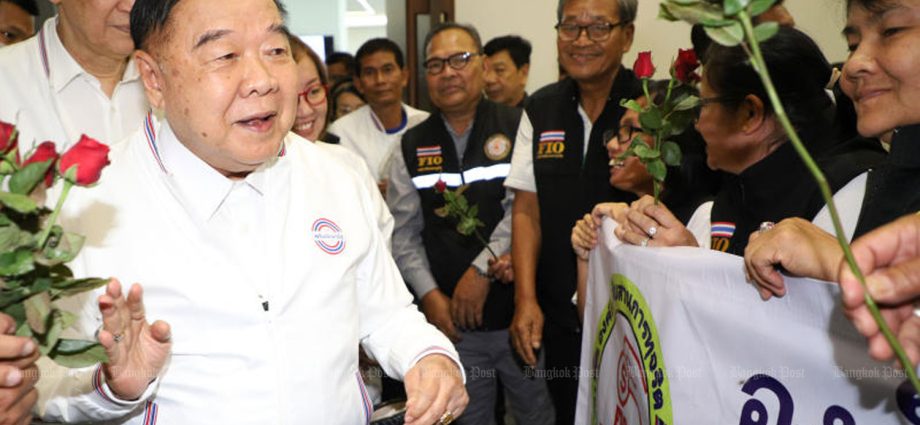PPRP leader says he works ‘behind the scenes’ to get liberals and conservatives to agree

National reconciliation is the only solution to Thailand’s deep political polarisation, especially during the run-up to the May 14 general election, says Gen Prawit Wongsuwon, the leader and sole prime ministerial candidate of the Palang Pracharath Party (PPRP).
In the latest in a series of Facebook posts written in his name, the caretaker deputy prime minister said he genuinely believes conservatives and liberals in the country can live together peacefully. He added that he has been working behind the scenes to facilitate this.
“And now that mudslinging in ongoing election campaigns is intensifying, I am concerned this tendency is likely to widen the nation’s political divisions even further,” he wrote.
“At the moment, certain political parties have gone too far in portraying their opponents as ‘enemies’, whom they aim to force to leave the country.”
He did not elaborate, but the reference appeared to be to remarks made recently by Pirapan Salirathavibhaga, leader of the United Thai Nation Party. He is also the party’s second prime ministerial candidate after Gen Prayut Chan-o-cha, the incumbent and erstwhile brother-in-arms of Gen Prawit.
Gen Prawit said he was not stressing the importance of building national reconciliation because he aims to make it his selling point in the election campaign but because he truly believes in it.
“Not many know that I have been working behind the scenes pushing for the conservative and liberal sides in the House to reconcile their differences,” he wrote.
In the conflict between these two sides over past constitutional amendments regarding the election system, for instance, Gen Prawit said he personally lobbied hard for the two sides to mend fences.
Even Gen Prayut, he claimed, had opposed a proposal by liberals in the House to amend the charter to use a dual-ballot method and that the list-MP calculation method should revert to using 100 as the divisor.
The new list-MP calculation method favours big parties over smaller ones, but the poorly understood calculation method employed by the Election Commission after the 2019 vote resulted in a dozen minnow parties gaining seats to prop up the Prayut-led government, which had a very slim majority initially.
“I was the one who stood up against such a potential abuse of power [to manipulate the election] and insisted it was time to handle politics in a way that is totally in line with democratic principles,” Gen Prawit wrote.
He said he had to handle a great deal of pressure not only in the coalition government but also within the PPRP. He said many MPs in the conservative camp didn’t approve of the proposed changes because they feared losing the coming election as they believed the new method would provide a large opposition party such as Pheu Thai with a better chance of winning.
That was an uphill struggle which Gen Prawit said he had eventually solved thanks to his determination, experience and good relationships with all sides.
“Politics can never progress if all sides still cannot get over an old conflict,” he said.

